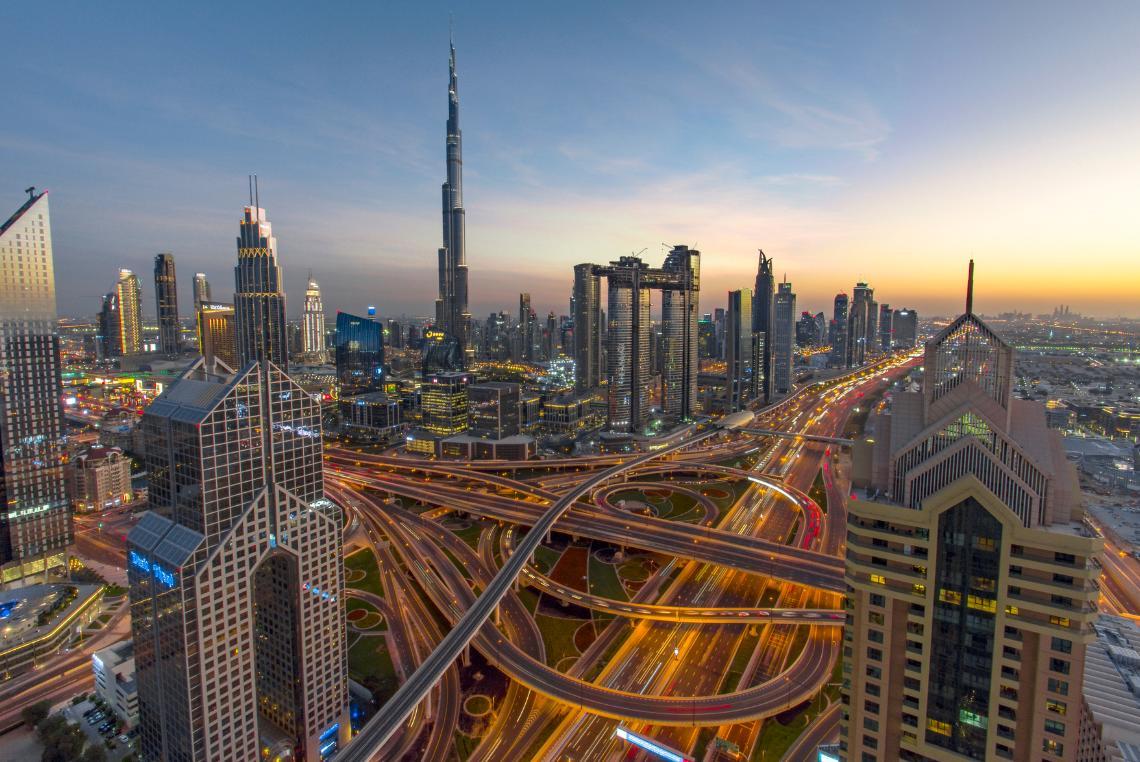Highest Paying Jobs in Dubai

Factors influencing high-paying jobs in Dubai in 2025
1. Government Initiatives
- Dubai's AI Strategy and Vision 2030 emphasize innovation, creating a high demand for tech professionals.
- Programs like Emiratisation, Operation 300bn, and the Dubai Economic Agenda (D33) aim to boost employment and attract global talent.
2. Economic Growth
- Robust GDP growth (projected at 3-4%) and increased non-oil exports are driving demand for skilled professionals in expanding sectors like finance, real estate, and technology.
- The tax-free environment and business-friendly policies make Dubai an attractive destination for multinational companies and high-paying roles.
3. Technological Advancements
- The rise of AI, blockchain, FinTech, and cybersecurity has reshaped the job market, offering lucrative roles in these fields.
- Digital transformation across industries is increasing demand for IT specialists, e-commerce managers, and digital marketing experts.
4. Sustainability and Renewable Energy
- The UAE's Clean Energy Strategy 2050 and Net Zero 2050 goals are driving recruitment in green technology roles like renewable energy engineers and sustainability consultants.
- High-paying opportunities are emerging for professionals specializing in solar energy and environmental management.
5. Healthcare Sector Expansion
- Investments in telemedicine, medical research, and state-of-the-art healthcare facilities create high-paying opportunities for medical specialists, healthcare administrators, and researchers.
- An ageing population and increasing demand for specialized care further fuel growth in this sector.
6. Real Estate Development
- Population growth and foreign investment are driving demand for architects, project managers, and urban planners as Dubai undertakes mega-projects like Expo City Dubai.
- Real estate managers remain among the highest-paid professionals due to the booming property market.
7. Rising Foreign Investments
- Increased foreign trade and investments in sectors like logistics, manufacturing, fintech, and corporate services are creating high-paying jobs.
- Free zones provide incentives that attract global firms to set up operations in Dubai.
8. Cost of Living Adjustments
- Rising living costs are pushing professionals to seek higher salaries to maintain financial stability.
- Employers are responding by offering competitive pay packages to retain talent amidst inflation-driven challenges.
9. Tourism and Hospitality Growth
- International events hosted by Dubai are creating high-paying roles in hotel management, event planning, and eco-tourism.
- Luxury tourism initiatives further enhance opportunities for hospitality professionals.
Dubai's dynamic economy, supported by government initiatives and technological advancements, continues to foster a thriving market for high-paying jobs across diverse sectors.
Benefits of working in Dubai
Tax-Free Income
Dubai offers a tax-free salary, meaning employees can enjoy their full earnings without deductions for personal income tax.
High Salaries
Compared to many other regions, Dubai often offers competitive and attractive salary packages, especially in skilled professions.
International Work Environment
With a diverse expatriate population, Dubai provides the opportunity to work in a multicultural and globally connected setting.
Career Growth Opportunities
Dubai's rapid economic development and business-friendly policies create numerous chances for career advancement and professional development.
Luxurious Lifestyle & Modern Amenities
Employees in Dubai enjoy a high standard of living with access to luxury housing, world-class shopping, dining, and entertainment.
Safety and Security
Dubai is considered one of the safest cities in the world, with low crime rates and strict law enforcement.
Networking & Business Exposure
As a global business hub, Dubai offers vast opportunities to build professional networks and gain exposure to international markets.
Connectivity & Travel
Dubai’s strategic location makes it easy to travel to Europe, Asia, and Africa, with a world-class airport and airline (Emirates).
Quality Healthcare and Education
The city has excellent healthcare facilities and international schools, making it ideal for families.
Types of Industries/Job Sectors in Dubai
Here's a table of the top high-paying industries in Dubai and their average annual income:
|
High-Paying Industries |
Average Annual Income |
|
Healthcare |
AED 360,000 - AED 2,160,000 |
|
Finance and Banking |
AED 288,000 - AED 1,200,000 |
|
Information Technology |
AED 216,000 - AED 840,000 |
|
Engineering and Construction |
AED 216,000 - AED 960,000 |
|
Aviation |
AED 420,000 - AED 960,000 |
|
Real Estate |
AED 240,000 - AED 840,000 |
|
Oil and Gas |
AED 480,000 - AED 840,000 |
|
Legal Services |
AED 660,000 - AED 1,080,000 |
|
Management Consulting |
AED 420,000 - AED 660,000 |
|
Marketing and Sales |
AED 360,000 - AED 840,000 |
These industries offer some of the highest-paying jobs in Dubai, with salaries ranging from AED 18,000 to AED 180,000 per month. The exact salary within each industry can vary based on factors such as experience, specific role, and company size.
Top 10 Highest Paying Jobs in Dubai for Indian Students
Below is a tabular representation of the most in-demand and highest-paying jobs in Dubai for 2025, along with their average annual income:
|
Job Title |
Average Annual Income (AED) |
|
Chief Executive Officer (CEO) |
AED 589,200 – 1,200,000 |
|
Chief Financial Officer (CFO) |
AED 549,600 – 1,080,000 |
|
Surgeon |
AED 469,200 – 1,000,000 |
|
Pilot |
AED 388,800 – 850,000 |
|
IT Manager |
AED 300,000 – 700,000 |
|
Bank Manager |
AED 628,800 – 1,000,000 |
|
Lawyer |
AED 669,600 – 900,000 |
|
Data Scientist |
AED 360,000 – 600,000 |
|
Software Engineer |
AED 200,000 – 600,000 |
|
Cybersecurity Specialist |
AED 300,000 – 600,000 |
Key Insights:
- Tax-Free Salaries: Dubai offers tax-free income for professionals across industries.
- High Demand Sectors: Finance (CFOs and Bank Managers), healthcare (Surgeons), and technology (IT Managers and Cybersecurity Specialists) dominate the high-paying job market.
- Experience and Qualifications: Salaries vary based on experience, qualifications like MBA or certifications, and company size
Skills and Qualifications Needed for High-Paying Jobs in Dubai
1. Industry-Specific Qualifications
- Professional Certifications: Certifications like PMP (Project Management), CFA (Finance), or ACCA/CPA (Accounting) significantly boost employability.
- Educational Degrees: A bachelor's degree is the minimum for many high-paying jobs, while a master's or MBA is often preferred in fields like management or finance.
- Engineering/IT Degrees: For roles in tech, construction, or oil and gas, specialized degrees are highly valued.
2. Technical and Digital Skills
- Software Proficiency: Skills in AutoCAD, SAP, Salesforce, or industry-specific software are often required.
- Data Analysis: Knowledge of data tools like Excel, Power BI, or Python is a plus across multiple sectors.
- Cybersecurity & Cloud Computing: In demand due to the digital transformation of businesses.
3. Multilingual Abilities
- English Proficiency: Essential for most jobs, especially in international companies.
- Arabic Language Skills: An added advantage, especially in government or public-facing roles.
- Other Languages: Hindi, Urdu, and Mandarin can be beneficial in dealing with diverse client bases.
4. Soft Skills
- Communication & Presentation: Crucial for leadership, sales, and client-facing roles.
- Leadership & Management: Needed for senior-level positions and team management.
- Adaptability & Cultural Awareness: Dubai is highly diverse; being culturally sensitive is key.
5. Work Experience
- Relevant Industry Experience: Proven experience in a similar role boosts credibility.
- Gulf Region Experience: Prior work in the UAE or GCC countries is often preferred by employers.
6. Networking and Professional Presence
- LinkedIn Optimisation: A strong LinkedIn profile can attract recruiters in Dubai.
- Professional Networking: Attending industry events and meetups helps in securing high-level opportunities.
How to Find High-Paying Jobs in Dubai in 2025?
Research the Job Market Trends
- Understand which industries are booming in 2025 such as tech, finance, real estate, and healthcare.
- Use job market reports and recruitment agency insights to spot high-demand roles.
Leverage Online Job Portals
- Use top platforms like LinkedIn, Bayt, GulfTalent, and Naukrigulf.
- Set up job alerts and optimize your profile to attract recruiters.
Target High-Income Sectors
- Focus on industries like IT, banking, engineering, aviation, and oil & gas.
- These sectors offer some of the most lucrative packages in Dubai.
Work with Recruitment Agencies
- Partner with reputed agencies like Michael Page, Robert Half, and BAC Middle East.
- They often have access to exclusive, high-paying roles.
Network Strategically
- Attend business events, expos, and industry-specific meetups in Dubai.
- Leverage LinkedIn to connect with decision-makers and HR professionals.
Tailor Your CV and Cover Letter
- Customise your resume for each role, focusing on achievements and measurable results.
- Highlight UAE-specific experience or knowledge if you have it.
Consider Professional Certifications
- Enhance your qualifications with certifications relevant to your field (e.g., PMP, CFA, AWS).
- This increases your credibility and earning potential.
Explore Government and Semi-Government Jobs
- These often offer excellent salaries, housing allowances, and other perks.
- Check websites like Dubai Careers (Dubai Government Human Resources) for listings.
Negotiate Your Salary
- Know your worth and be prepared to negotiate during the offer stage.
- Use cost-of-living data and salary benchmarks to justify your expectations.
Cost of Living in Dubai for Indian Students
Here is a table summarising the average annual costs for Indian students living in Dubai:
|
Expense |
Average Annual Cost (AED) |
Average Annual Cost (INR) |
|
Accommodation |
AED 32,400 - 84,000 |
INR 7,38,000 - 19,00,000 |
|
Food and Groceries |
AED 18,000 - 24,000 |
INR 4,07,000 - 5,46,000 |
|
Public Transportation |
AED 1,200 - 3,600 |
INR 27,000 - 81,000 |
|
Mobile & Internet |
AED 1,920 |
INR 43,000 |
|
Health Insurance |
AED 600 - 2,400 |
INR 13,600 - 54,000 |
|
Miscellaneous |
AED 1,200 - 3,480 |
INR 27,000 - 78,000 |
|
Tuition Fees (Public & Private Universities) |
AED 20,000 - 70,000 |
INR 4,52,000 - 15,81,000 |
|
Total Living Expenses (excluding tuition) |
AED 54,120 - 1,21,680 |
INR 12,23,000 - 27,60,000 |
Note:
- The exchange rate used is approximately 1 AED = 22.63 INR.
- The ranges provided are based on various sources and can vary significantly depending on lifestyle and location.
- Tuition fees are not included in the total living expenses but are listed separately for clarity.
Challenges of Working in Dubai
Cultural Differences
Adapting to a new culture can be challenging, especially with Dubai’s blend of Islamic traditions and modern values.
High Cost of Living
While salaries can be attractive, the cost of housing, schooling, and healthcare can be significantly high.
Strict Laws and Regulations
Dubai has strict rules on behavior, dress code, and public conduct, which may differ greatly from other countries.
Work-Life Balance
Long working hours are common, and achieving a balanced lifestyle can be tough, especially in high-demand sectors.
Job Security Concerns
Many jobs are contract-based, and employment laws may not always favour the employee, especially during termination.
Visa and Residency Tied to Employment
Your legal stay in Dubai is tied to your job, which can create stress if your employment status changes.
Limited Permanent Residency Options
Unlike some countries, long-term residency or citizenship is hard to obtain, even after years of working in Dubai.
Application Process of Dubai Work Visa
Applying for a Dubai work visa involves several steps, which can be summarised as follows:
Step-by-Step Process for Dubai Work Visa Application
Determine the Type of Visa:
Identify the type of work visa you need based on your employment offer and duration of stay in Dubai.
Secure a Job Offer and Sponsorship:
Obtain a formal job offer from a Dubai-based employer who will act as your sponsor.
Sign the Employment Contract:
Review and sign an employment contract that outlines your job role, salary, and employment terms. The contract must be submitted to the Ministry of Labour for approval.
Obtain Visa Quota Approval (if applicable):
If your employer is in a free zone, they must apply for visa quota approval from the Ministry of Labour.
Apply for an Entry Permit:
Your employer will apply for an entry permit on your behalf. This permit allows you to enter Dubai to complete the visa formalities.
Enter Dubai on an Entry Permit:
Travel to Dubai using the entry permit, which is typically valid for 60 days.
Medical Fitness Test:
Undergo a medical fitness test at an authorized medical centre in Dubai. This test is mandatory for all work visa applicants.
Apply for an Emirates ID:
Register for an Emirates ID, which is required for residence visa applications and serves as identification in the UAE.
Submit Labor Contract and Other Documents:
Your employer must upload your labour contract to the Ministry of Labour's website and ensure all necessary documents are submitted.
Health Insurance:
Ensure you have health insurance coverage, either provided by your employer or purchased independently.
Receive Work and Residence Visas:
After completing all formalities, you will receive your work visa and residence visa. The residence visa is typically valid for two years and is renewable.
Finalise Payroll and Begin Work:
Once you have your work visa, you can legally start working in Dubai, and your employer can initiate payroll formalities.
Required Documents for Dubai Work Visa
To apply for a Dubai work visa, you need to provide several essential documents. Here are the key documents required, explained in brief:
Required Documents for Dubai Work Visa
- Valid Indian Passport: Ensure your passport is valid for at least six months from the date of entry into Dubai and has enough blank pages for visa stamps.
- Employment Contract/Offer Letter: This document should include details such as job title, salary, benefits, and duration of employment. It is typically provided by your Dubai-based employer.
- Educational Certificates: Copies of degree/diploma certificates and transcripts attested by relevant academic authorities in your home country.
- Experience Certificates: Attested certificates from previous employers demonstrating your work experience and skills.
- Medical Certificate: Issued by a UAE-approved medical centre in India or after arrival in Dubai, confirming you are free from infectious diseases.
- Passport-Sized Photos: Recent photos with a white background, as per UAE visa specifications.
- Visa Application Form: Completed and signed, usually provided by the employer or available online.
- Entry Permit: Issued by the Ministry of Labor, facilitated by your employer.
- Police Clearance Certificate: This may be required by some employers to ensure a clear background.
- Emirates ID Application: Mandatory for all residents; involves biometric data collection.
- Company Trade License: A copy of the trade license from the sponsoring company.
These documents are crucial for securing a work visa and residency in Dubai. The employer typically handles the application process, but you must provide the necessary documents.
FAQs
What are the highest-paying jobs in Dubai?
Roles in the medical, legal, finance, and tech sectors—such as surgeons, lawyers, and data scientists—typically top the list.
Which industries offer the best salaries in Dubai?
The finance, healthcare, engineering, and IT industries often provide the most lucrative compensation packages.
Do expats earn more in Dubai?
Yes, expats in senior or specialised roles often receive competitive tax-free salaries along with benefits like housing and transport.
Is there a tax on high salaries in Dubai?
No, the UAE currently does not impose income tax, making high-paying jobs even more attractive.
How can I find a high-paying job in Dubai?
Networking, working with recruitment agencies, and using job portals like LinkedIn or Bayt are great ways to find top-paying roles.
Why Choose Karan Gupta Consulting?
- 27+ years of expertise in overseas education consulting
- 160,000+ students successfully counselled
- Personal guidance from Dr. Karan Gupta, Harvard Business School alumnus
- Licensed MBTI® and Strong® career assessment practitioner
- End-to-end support from career clarity to visa approval

Dr. Karan Gupta
Harvard Alumnus | Career Counsellor
With 27+ years of experience, Dr. Karan Gupta has helped 160,000+ students achieve their study abroad dreams at top universities worldwide.




